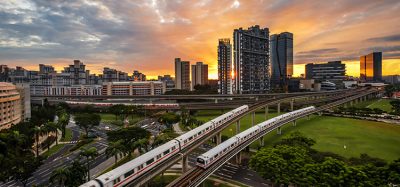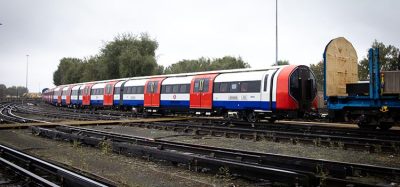Design & supervision – important elements of railway investments
Posted: 1 August 2008 | | No comments yet
The rapid development of road and railway transport is a regular subject of public debate in Poland, in particular in the view of the EURO 2012 organisation. It is worth noticing that from 2007 to 2013, the Polish Railway Authority, PKP PLK, plans to carry out a number of major investments. Jacek Stirmer, Director of the Strategy Office of PKP PLK SA says that by 2012, PKP PLK plans to modernise 1,248km of railroads within the Infrastructure and Environment Operational Programme.
The rapid development of road and railway transport is a regular subject of public debate in Poland, in particular in the view of the EURO 2012 organisation. It is worth noticing that from 2007 to 2013, the Polish Railway Authority, PKP PLK, plans to carry out a number of major investments. Jacek Stirmer, Director of the Strategy Office of PKP PLK SA says that by 2012, PKP PLK plans to modernise 1,248km of railroads within the Infrastructure and Environment Operational Programme.
The rapid development of road and railway transport is a regular subject of public debate in Poland, in particular in the view of the EURO 2012 organisation. It is worth noticing that from 2007 to 2013, the Polish Railway Authority, PKP PLK, plans to carry out a number of major investments (see maps).
Jacek Stirmer, Director of the Strategy Office of PKP PLK SA says that by 2012, PKP PLK plans to modernise 1,248km of railroads within the Infrastructure and Environment Operational Programme.
In the second half of 2007, PKP PLK signed several agreements for supervision of line modernisation, crucial for the expansion of Pan-European transport corridors.
One of the latest agreements is between ARCADIS Profil and BRI Koltech Inwestor, which involves modernisation of the E65 railroad from Warszawa Wschodnia to Nasielsk. The project is carried out with 84% of money from the Cohesion Fund (16% of the funds will be provided by the state budget), and is worth €4,439,000 net. Works have been broken into 10 periods, and the agreement will be performed over a period of four years.
The main objectives of the E65 railroad modernisation include:
- Prepare the technical infrastructure of the line for operating parameters specified in AGC and AGTC agreements (passenger train speeds of up to 200km/h, cargo train speeds of up to 120km/h with the axle load of 225 kN)
- Fulfil the requirements of the European Commission decision concerning the technical specifications for interoperability relating to the subsystems of maintenance, control, infrastructure, energy, operation and rolling stock in the Trans-European high-speed system
- Increase traffic control system effectiveness
- Support stopping of trains on auxiliary tracks without the need to occupy mainline tracks, thanks to the upgrade of track systems at the stations
- Increase safety at the railway crossings with two-level crossings and equip other crossings with modern signalling and visual supervision
- Increase the quality of transport and raise the effectiveness of line use with modern 6 MW electrical engines and tilt-body rolling stock, shortened travelling times and increased line throughput
- Keep the existing functions of selected stations with potential expansion of the transport offer in the future
- Improve connections in the Trans-European transport network (TEN-T) among the northern and southern countries in Europe
- Improve environmental protection in the area of construction works
- Reduce the environmental risks of hazardous cargo
- Significantly reduce current operating costs of the infrastructure by using reliable and durable materials, improving the transport offer and consequently increasing the number of customers thanks to enhanced travelling comfort, shorter travelling times, greater competitive leverage of trains (speed and punctuality) and improved passenger safety and security.
The line Gdynia-Gdan´sk-Warszawa is of major importance since it is the starting section of the Pan-European Transport Corridor no. 6 and is the E65 international communication route from Gdynia via Zebrzydowice and Vienna to Rijeka, and is covered by AGC and AGTC agreements.
Supervision and management are also the subjects of one of four contracts signed in connection with the modernisation of a much publicised Warsaw-Łódz´ railroad. It is currently the largest investment pursued within the Sectoral Operational Programme – Transport (project SPOT/1.1.1./82/04). The modernised line is 62.8km long and includes 142km of tracks, 160 turnouts and 131 of traction network. The value of works is PLN 905.1 million, with 75% (PLN 678.8 million) covered by the European Regional Development Fund, and 25% (PLN 226.3 million) covered by the state budget.
The first stage is the modernisation and reconstruction of Skierniewice-Łódz´ Widzew section. The basic objectives are to:
- Upgrade the tracks to allow train speeds of between 140km/h and 160km/h
- Upgrade four existing bridges and six viaducts, and build two foot tunnels
- Upgrade tracks at 37 existing railway crossings
- Build new structures within the environmental infrastructure to a total length of 9.4km
The scope of works covers, among others:
- Replacement of rails and sleepers on the line and at the stations and upgrade of railroad bed drainage
- Traction network upgrade
- Upgrade of railway crossings surfaces: construction of roads parallel to tracks where possible
- Upgrade and reconstruction of civil engineering structures, bridges, viaducts and culverts,
- Construction of a foot tunnel and passages for forest animals
- Upgrade of communication equipment and railway traffic control equipment to support remote control
Particular attention has been paid to environmental issues on the line. The plans include the following solutions:
- Selected civil engineering structures will be adapted to work as passages for animals and new structures will be built to preserve migration corridors
- Installation of deterring devices on selected sections
- Reduction of noise and vibrations (construction of noise screens and vibration damping mats)
Modernisation of the whole Warsaw-Łódz´ line, encompassing preparation of design documentation and construction works is scheduled to take place from 2007 to 2012. The works will allow shortening the travelling time from 120 minutes to just 65 minutes – a decrease of 40%. An increase of passenger runs by 26% and cargo runs by 2% is expected. The modernisation will also improve the standard comfort, safety and security of travel. It will also reduce the environmental impact resulting from emissions of combustion fumes, vibration and noise.
Another important investment is the modernisation and reconstruction of the E20 railroad from Siedlce to Terespol. The 700km line is a part of the Pan-European Transport Corridor West-East, connecting Berlin and Moscow. In Poland, the Corridor crosses Wielkopolska, Mazowsze and Podlasie regions. The objective of modernisation is to adjust line parameters to EU standards and conditions of AGC conditions (main international railroads) and AGTC (main international combined transport lines).
For the Biała Podlaska-Terespol section on the E20 railroad, designs for reconstruction of civil engineering structures are being developed (viaducts, bridges and culverts) at the Siedlce-Terespol section, including designs for reconstruction of six major bridges and several culverts, as well as a construction design for a new underground foot tunnel at Chotyłów station.
Modernisation and reconstruction of the E20 railroad from Siedlce to Terespol will result in a major improvement of the passenger and cargo operations, shorter travel times and greater line capacity, as well as improved safety at railway crossings and passages at the track level. Passenger trains will travel up to 160km/h and cargo trains up to 120km/h; the maximum axle load will be increased to 230 kN.
“As a result of the investment task, the quality of railroads will increase. Modernisations will improve travelling comfort and shorten travel times between large urban areas”, says Wojciech Rybak, Director of the Investment Office of PKP PLK.
The company which has been effectively using the current market conditions is ARCADIS Profil, which participates in all of the aforementioned investments as a member of various consortia. For years, the company has specialised in design and supervision of road construction and reconstruction, including motorways, communication systems, and engineering structures. Recently, the company has expanded their scope of services to include design and supervision related to railway construction.
“Our plans obviously take into account very promising growth prospects for the railway sector. Thus the railways are the second most important direction (to roads) for the development of our company in the infrastructure sector. We deal in supervising railway projects, e.g. the Warsaw-Nasielsk section or the Skierniewice-Łódz´ Widzew section; we also provide design services, for example for the E20 line, the Biała Podlaska-Terespol section. Since we operate not only in the infrastructure sector, but also the environmental sector, we are able to provide comprehensive services, which consist in project management in line with environmental requirements”, says Marek Adamek, the CEO of ARCADIS Polska. “Our international experience and support from our international partners is also an advantage”.
Coming from the Netherlands with 60 years of experience in the railway sector, the ARCADIS NV Group has completed many major railway investments all over the world, including the ballast-free fast railway from Frankfurt am Main to Cologne, and the upgrade and expansion of the Amsterdam-Utrecht railroad from two to four tracks. The company also completed projects related to urban railway communication (fast urban trains, metro, tramways), including construction of a new North-South line on the fast urban railway system in Amsterdam.
For many years, the company has utilised experience and specialised software development for Poland. Technologies already proven in other countries are being implemented in Poland, and experience of the company, not only in the European market, ensures correct progress of the contractual works, which is particularly important given the fact that time is a factor for the Polish state.
OUT NOW: The Definitive Guide to Rail’s Digital Future
The rail industry is undergoing a digital revolution, and you need to be ready. We have released our latest market report, “Track Insight: Digitalisation.”
This is not just another report; it’s your comprehensive guide to understanding and leveraging the profound technological shifts reshaping our industry. We move beyond the buzzwords to show you the tangible realities of AI, IoT, and advanced data analytics in rail.
Discover how to:
- Optimise operations and maintenance with real-time insights.
- Enhance passenger services through seamless, high-speed connectivity.
- Leverage technologies like LEO satellites to improve safety and efficiency.
Featuring expert analysis from leaders at Nomad Digital, Lucchini RS, Bentley Systems and more, this is a must-read for any rail professional.







